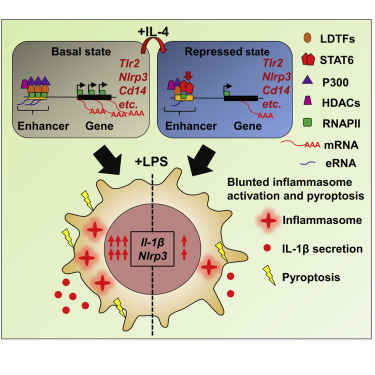Immunity ( IF 32.4 ) Pub Date : 2018-01-16 , DOI: 10.1016/j.immuni.2017.12.010 Zsolt Czimmerer , Bence Daniel , Attila Horvath , Dominik Rückerl , Gergely Nagy , Mate Kiss , Matthew Peloquin , Marietta M. Budai , Ixchelt Cuaranta-Monroy , Zoltan Simandi , Laszlo Steiner , Bela Nagy , Szilard Poliska , Csaba Banko , Zsolt Bacso , Ira G. Schulman , Sascha Sauer , Jean-Francois Deleuze , Judith E. Allen , Szilvia Benko , Laszlo Nagy

|
The molecular basis of signal-dependent transcriptional activation has been extensively studied in macrophage polarization, but our understanding remains limited regarding the molecular determinants of repression. Here we show that IL-4-activated STAT6 transcription factor is required for the direct transcriptional repression of a large number of genes during in vitro and in vivo alternative macrophage polarization. Repression results in decreased lineage-determining transcription factor, p300, and RNA polymerase II binding followed by reduced enhancer RNA expression, H3K27 acetylation, and chromatin accessibility. The repressor function of STAT6 is HDAC3 dependent on a subset of IL-4-repressed genes. In addition, STAT6-repressed enhancers show extensive overlap with the NF-κB p65 cistrome and exhibit decreased responsiveness to lipopolysaccharide after IL-4 stimulus on a subset of genes. As a consequence, macrophages exhibit diminished inflammasome activation, decreased IL-1β production, and pyroptosis. Thus, the IL-4-STAT6 signaling pathway establishes an alternative polarization-specific epigenenomic signature resulting in dampened macrophage responsiveness to inflammatory stimuli.
中文翻译:

转录因子STAT6介导直接抑制炎性增强剂,并限制极化极化巨噬细胞的激活。
信号依赖的转录激活的分子基础已经在巨噬细胞极化中进行了广泛的研究,但我们对阻抑的分子决定因素的理解仍然有限。在这里我们显示,IL-4激活的STAT6转录因子是体外和体内大量基因直接转录抑制所必需的替代性巨噬细胞极化。抑制导致谱系决定转录因子,p300和RNA聚合酶II结合减少,随后增强子RNA表达降低,H3K27乙酰化和染色质可及性降低。STAT6的阻遏功能是HDAC3依赖于IL-4抑制基因的子集。此外,STAT6抑制的增强子显示与NF-κBp65综合征广泛重叠,并且在对一部分基因进行IL-4刺激后,对脂多糖的反应性降低。结果,巨噬细胞表现出减少的炎性体活化,减少的IL-1β产生和发烧。因此,IL-4-STAT6信号通路建立了另一种极化特异性表观遗传学特征,导致巨噬细胞对炎症刺激的反应减弱。



























 京公网安备 11010802027423号
京公网安备 11010802027423号